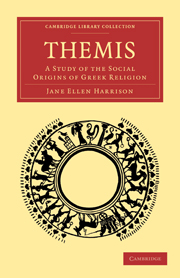Book contents
- Frontmatter
- PREFACE TO THE SECOND EDITION
- INTRODUCTION
- Contents
- ADDENDA ET CORRIGENDA
- CHAPTER I THE HYMN OF THE KOURETES
- CHAPTER II THE DITHYRAMB, THE Δρώμενον AND THE DRAMA
- CHAPTER III THE KOURETES, THE THUNDER-RITES AND MANA
- CHAPTER IV MAGIC
- CHAPTER V TOTEMISM, SACRAMENT AND SACRIFICE
- CHAPTER VI THE DITHYRAMB, THE SPRING FESTIVAL AND THE HAGIA TRIADA SARCOPHAGOS
- CHAPTER VII THE ORIGIN OF THE OLYMPIC GAMES
- CHAPTER VIII DAIMON AND HERO
- CHAPTER IX FROM DAIMON TO OLYMPIAN
- CHAPTER X THE OLYMPIANS
- CHAPTER XI THEMIS
- INDEX
CHAPTER VIII - DAIMON AND HERO
Published online by Cambridge University Press: 07 October 2011
- Frontmatter
- PREFACE TO THE SECOND EDITION
- INTRODUCTION
- Contents
- ADDENDA ET CORRIGENDA
- CHAPTER I THE HYMN OF THE KOURETES
- CHAPTER II THE DITHYRAMB, THE Δρώμενον AND THE DRAMA
- CHAPTER III THE KOURETES, THE THUNDER-RITES AND MANA
- CHAPTER IV MAGIC
- CHAPTER V TOTEMISM, SACRAMENT AND SACRIFICE
- CHAPTER VI THE DITHYRAMB, THE SPRING FESTIVAL AND THE HAGIA TRIADA SARCOPHAGOS
- CHAPTER VII THE ORIGIN OF THE OLYMPIC GAMES
- CHAPTER VIII DAIMON AND HERO
- CHAPTER IX FROM DAIMON TO OLYMPIAN
- CHAPTER X THE OLYMPIANS
- CHAPTER XI THEMIS
- INDEX
Summary
‘INCERTUS GENIUMNE LOCI, FAMULUMNE PARENTIS
ESSE PUTET.’
In the last two chapters we have examined in some detail two great festivals of the Greeks, the spring Dithyramb, which according to Aristotle gave birth to the drama, and the Olympic Games celebrated every fifth year at or after the summer solstice. We have seen that the primary gist of both these festivals was the promotion of fertility and that each of them alike gave birth to a daimon of fertility who took on various names and shapes. The Dithyramb gave birth to the Greatest Kouros whose matured form in Crete was that of Father Zeus, but elsewhere he crystallized as Kouros into the figure of Dionysos. At Olympia, starting again from the Kouretes the daimon of fertility took various heroic shapes as Oinomaos, as Pelops, and finally again bequeathed something of his nature and functions to the Olympic Zeus himself.
We have by this time a fairly clear notion of one element in the nature of a daimon. We have seen him to be the product, the projection, the representation of collective emotion. Normally and naturally he is attended by the group or thiasos that begets him, but gradually he attains independent personality. We have also seen that in primitive communities this collective emotion focuses around and includes food interests and especially food-animals and fruit-trees.
- Type
- Chapter
- Information
- ThemisA Study of the Social Origins of Greek Religion, pp. 260 - 363Publisher: Cambridge University PressPrint publication year: 2010First published in: 1912



